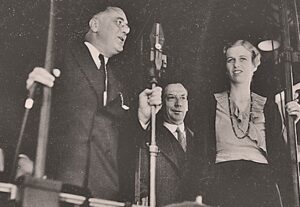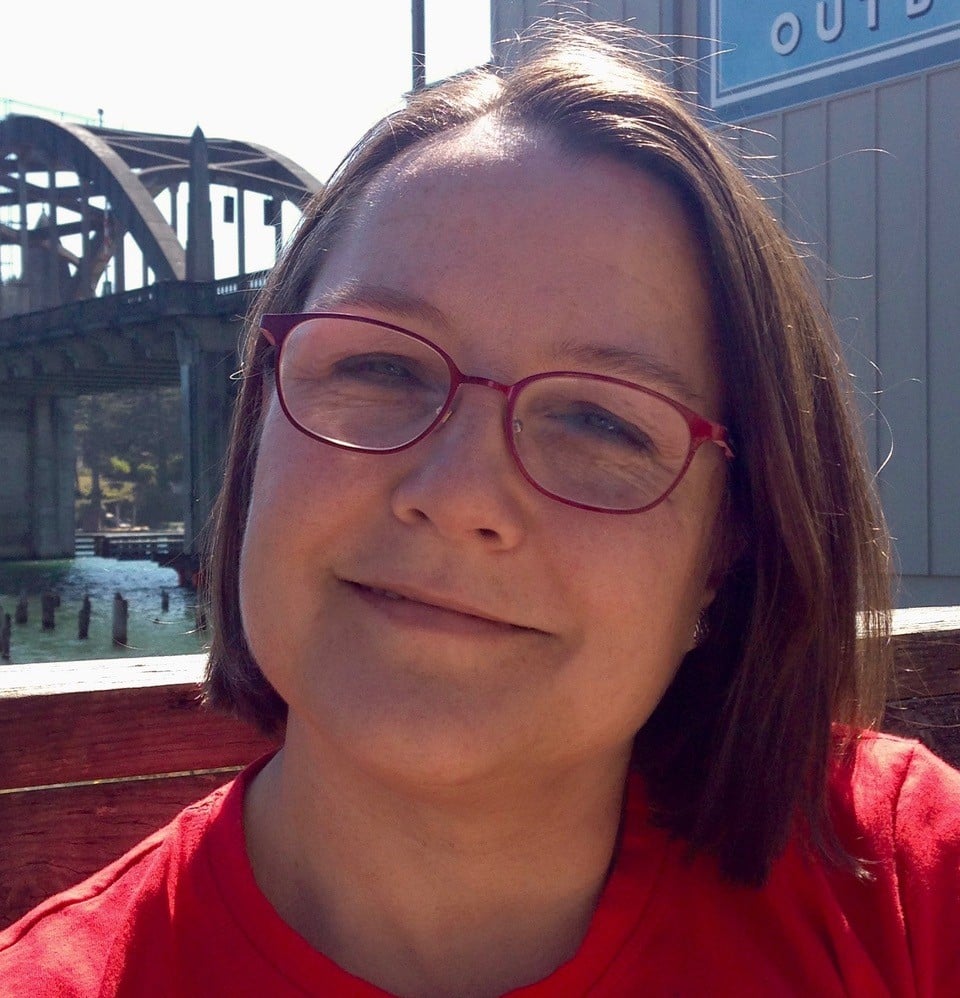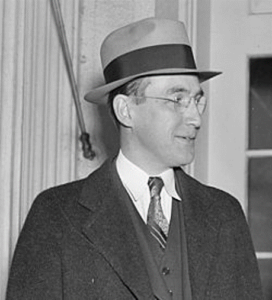 Governor Franklin D. Roosevelt, Francis Carr, and Anna Redding in California, 22 September 1932. Courtesy of the Franklin D. Roosevelt Presidential Library and Museum
Governor Franklin D. Roosevelt, Francis Carr, and Anna Redding in California, 22 September 1932. Courtesy of the Franklin D. Roosevelt Presidential Library and Museum
When this blog was still fairly new, Christopher Carter Lee did a great post on discovering the political leanings of one’s ancestors. Since this is not only a presidential election year, but also the centennial of the first such election in which females could participate, I thought it would be fun to share a little tidbit I gleaned from my great-grandfather’s[1] reminiscences. Yes, I do know how blessed I am to have such a document in my possession, even if it’s a very blurry copy of a fourth carbon copy. I will let him tell the story in his own words:
“In 1932, Franklin Delano Roosevelt was making his first campaign for the presidency of the United States, and delivered, in San Francisco, what was said to be one of his most famous addresses, before the Commonwealth Club of California, the largest club of its kind in America. I was its quarterly chairman; accordingly, it fell to me to introduce him. At that time he was Governor of the State of New York.
“About two weeks prior to the appointed date for the address, a subcommittee of the Democratic State Central Committee called on me to inquire if they could furnish me any data that might be helpful to me in preparing my introduction. It was quite obvious that what they really wanted was to learn what I intended to say, for they were fully aware that my party affiliation was not that of Mr. Roosevelt. I told them that I really did not know what I was going to say, but that I would be fair. They left with unconcealed disappointment.
“About a week later, a group representing the Republican State Central Committee sought and was granted an interview. Knowing that I was a Republican, they made no secret that they were concerned that I might possibly change my political party in the hope that I might be on the ‘band wagon’ should Roosevelt be elected. I gave them no intimation of my intentions in this regard. I simply told them that I would try to introduce the speaker in a manner befitting the Commonwealth Club, the basic principle of which is ‘Get the Facts.’
"I told them that I really did not know what I was going to say, but that I would be fair. They left with unconcealed disappointment."
“The day before the address, I made a courtesy call on the governor at the Palace Hotel. I was introduced to the candidate. He was seated in a large armchair, busily engaged in editing his proposed speech. I explained to him who I was and that I would be present to escort him to the banquet table.
“I asked him how he pronounced his name, as there is really nothing quite so embarrassing to a speaker as a mispronunciation of his name upon his introduction. He told me his name was pronounced as if it were spelled ‘Rosevelt.’ I then inquired if there was anything in particular he wanted me to say. ‘No,’ said he, ‘all I want is a square deal.’ ‘You will have that,’ I assured him.
“As we chatted, he asked about what percentage of the members of the Commonwealth Club were Republicans. I replied, ‘About eighty percent.’ Whereupon he said, ‘I think I’ll have to change some parts of this speech.’
“I bid the candidate goodbye and started to leave. As I reached the door, it occurred to me that I had not been quite candid; that perhaps he was under the impression that I was one of his California supporters. I returned and said, ‘Governor Roosevelt, I think I should tell you that while I’m going to introduce you and shall do so fairly, I am not going to vote for you.’ With that, he threw back his head and burst forth with a most hearty and infectious laugh, and said, ‘All I want is a square deal.’
“On the day of the luncheon, he was escorted to the table by his son Jimmie[2] and me. Mr. Roosevelt was seated on my right. There was a tremendous gathering of both Democrats and Republicans, as well as middle-of-the-roaders. My introduction took about three minutes. However, instead of introducing him to the gathering, I introduced the gathering to him.
“Upon my return to my office, there were a number of telegrams on my desk from various sections of the country,[3] congratulating me on my introduction. One of the telegrams was from a man in Riverside, California, the substance of which was ‘Congratulations on your introduction; it was the only damn thing worth listening to.’ It did not take much mental effort to determine the political affiliation of that man.
“The next morning, I was shocked to see, in all the San Francisco daily newspapers, a picture of Mr. Roosevelt and me seated at the table, with some six or eight prominent Democratic ‘wheel horses’—Jim Farley[4] and other national figures—standing behind us. The picture carried the subscription, ‘Prominent Democrats who attended the luncheon to Mr. Roosevelt.’ I immediately addressed a letter to each of the newspapers, telling them that I was not a Democrat and that I was not going to vote for Mr. Roosevelt. Much to my dismay, only one of the papers, the San Francisco Chronicle, published that statement.[5]
"I immediately addressed a letter to each of the newspapers, telling them that I was not a Democrat and that I was not going to vote for Mr. Roosevelt."
“My son, Folger, was very anxious to meet the governor, as he had never met a presidential candidate. I succeeded in making the introduction that Folger so much desired. Upon being introduced, Mr. Roosevelt took Folger’s right hand, clasped his left hand over it, looked Folger squarely in the eyes, shook hands warmly, and exclaimed, ‘My, my, I did not know you had such a fine son. He and my son, Jimmie, should have much in common.’ Folger was delighted, and he and Jimmie went off together.
“That evening, at the dinner table in our home, we had guests. It was evident that Folger was anxious to tell of his experience with the governor. However, it was not convenient to tell of his meeting until we had retired to the living room. He immediately commenced to unfold the tale of his historic meeting. As he did so, one could envision an egoistic balloon rising and becoming inflated as the story proceeded. His mother was seated as he talked, and listened closely to the tale. When he had concluded, his mother[6] said in her quiet way, ‘That proves that he’s a baby kisser.’ The balloon collapsed; the glamour of the occasion faded.”[7]
Notes
[1] Fred Goodrich Athearn (1874–1956).
[2] James Roosevelt (1907–1991) was the oldest son of President Franklin D. Roosevelt. He served as the official Secretary to the President during his father’s administration, was a Marine Corps officer during World War II, and later served in U.S. Congress. It should be noted, when my great-grandfather wrote that he and Jimmie escorted FDR to the table, this was no mean feat: the future president was not actually able to walk, and really just moved his legs back and forth as his weight was primarily supported by those assisting him.
[3] The Commonwealth Club’s meetings were – and continue to be – carried by radio stations throughout the country. Sadly, their archive of recorded broadcasts does not go back as far as 1932, since I would dearly love to hear my great-grandfather’s voice.
[4] James Aloysius Farley (1888–1976) was one of the first Irish Catholic politicians to succeed on the national level. He was a Knight of Malta and a “king maker,” running the gubernatorial campaigns of Alfred E. Smith and Franklin D. Roosevelt. He served simultaneously as Chairman of the Democratic National Committee and Postmaster General during the first two Roosevelt administrations, and disapproved of FDR’s third (and fourth) presidential campaigns, believing that no one should seek more than two terms. He later became president of the Coca-Cola Export Corporation.
[5] This was probably of even greater concern to the author than to the average person, since he had recently served in the Republican administration of California Governor C. C. Young (1869–1947).
[6] Purle Evelyn (Bottom[e]s) Athearn (1878–1941).
[7] Since this account makes it sound as though my grandfather was still in short trousers, it should be pointed out that he was a year older than Jimmie Roosevelt, and had been married for three years!
Share this:

About Pamela Athearn Filbert
Pamela Athearn Filbert was born in Berkeley, California, but considers herself a “native Oregonian born in exile,” since her maternal great-great-grandparents arrived via the Oregon Trail, and she herself moved to Oregon well before her second birthday. She met her husband (an actual native Oregonian whose parents lived two blocks from hers in Berkeley) in London, England. She holds a B.A. from the University of Oregon, and has worked as a newsletter and book editor in New York City and Salem, Oregon; she was most recently the college and career program coordinator at her local high school.View all posts by Pamela Athearn Filbert →
